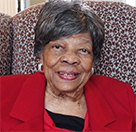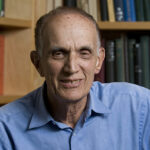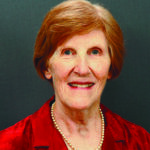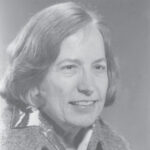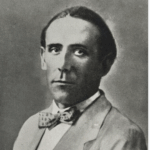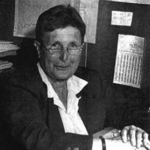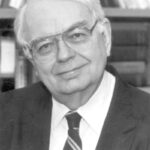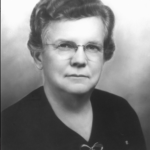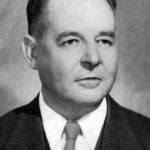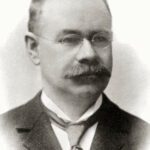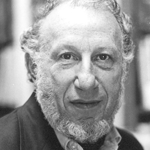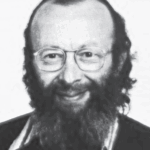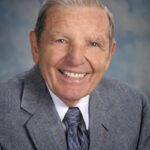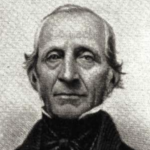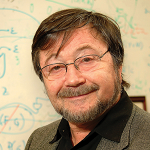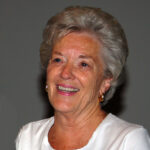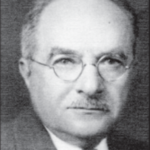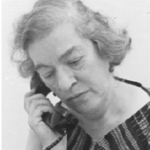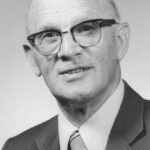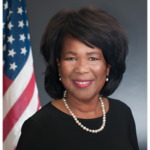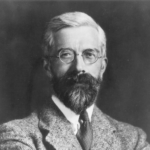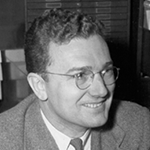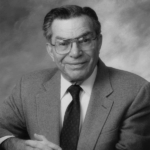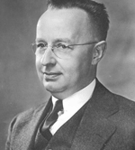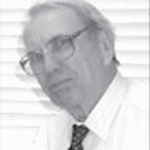Here you will find biographies of some of the most accomplished statisticians in history. If you have additional or missing biographical information, papers, or related links that you feel would be of value, please send them to megan@amstat.org. Visit the community site for the History of Statistics to learn more about the development of statistical thought and practice.
Ada Byron
Ada Byron, Lady Lovelace, was one of the most picturesque characters in computer history. Augusta Ada Byron was born December 10, 1815, the daughter of the illustrious poet Lord Byron.
Annie Mae Turner Taylor Randall
Annie Mae Randall began her government career at the United States War Production Board during WWII and was known as one of the “Government Girls.” She was responsible for the calculations behind the book, Human Aging, published in the late 1960s, and still referenced and used today for behavioral and biological studies.
Arlene Sandra Ash
Ash cofounded DxCG, Inc., a company that conducts research targeting the needs of public and private health insurers and urchasers and promotes “fair and efficient health care” via predictive software.
Arnold Zellner
Kathy Morrissey interviewed Arnold to learn more about him as a person: his childhood, early career, and interests. This is what she found.
Bradley Efron
Bradley Efron, professor of statistics and biomedical data science at Stanford University, developed “bootstrap,” a method for assessing the uncertainty of scientific results that has had extraordinary impact across many scientific fields.
C. R. Rao
Rao has done much to advance knowledge in theory and practice of statistical inference. His book, Linear Statistical Inference and Its Applications, has been cited nearly 17,000 times.
Charles Kincannon
Charles Louis Kincannon, who was 72 when he passed away in December 2012, enjoyed a rich career in statistics lasting 45 years.
Columbus Clark Cockerham
C. Clark Cockerham is remembered for his pioneering formulation of new statistical theory in quantitative genetics and for establishing principles for the understanding of heredity and the genetic improvement of animals and plants.
David H. Blackwell
Blackwell, a former vice president of the ASA and the first African American mathematician elected to the National Academy of Science.
Dionne Price
Dionne Price, the first African-American president of the American Statistical Association was widely respected for her work advancing statistical science and policy, as well as her commitment to mentoring, diversity, and inclusion in the field.
Donna Brogan
Over nearly four decades, Brogan made significant contributions to biostatistics, particularly in sample survey design and public health research, including work that informed breast cancer studies and population-level health data.
Dorothy P. Rice
Dorothy P. Rice was the keeper of the nation’s health statistics and helped create the national death index.
Doug Zahn
Doug Zahn was a professor of statistics at Florida State University and a pioneer in statistical consulting education and a mentor to many.
Edward Jarvis
Edward Jarvis, the third president of the American Statistical Association, was born January 9, 1803, in Concord, Massachusetts, as the fourth of seven children born to Deacon Francis and Millicent (Hosmer) Jarvis.
Egon S. Pearson
Egon Sharpe Pearson was a leading figure on the world statistical scene and an honorary member of the American Statistical Association.
Elizabeth L. Scott
In the 1960s and 70s, Scott raised funds for civil rights efforts and used her statistical skills to document gender discrimination in higher education.
Emil Gumbel
Gumbel, sometimes called an “apostle of peace,” tracked political assassinations—among other data—in Germany prior to the outbreak of WWII.
Florence N. David
David worked throughout World War II in the statistical sciences. She was an experimental officer for the Ordinance Board at the Ministry of Supply and a senior statistician for the Research and Experiments Department at the Ministry of Home Security. She was also a member of the Land Mines Committee at the Scientific Advisory Council and a scientific advisor on mines for the Military Experimental Establishment.
Florence Nightingale
Florence Nightingale was a pioneering statistician who used data visualization—most famously her “coxcomb” charts—to revolutionize health care and dramatically reduce mortality through evidence-based reforms.
Francis Amasa Walker
A Pioneer with Everlasting Energy “General Walker considered each and every one of them [his public offices] a trust to be administered with integrity and with courage. He received degrees from more institutions of learning…
Frederick L. Hoffman
The seventh president of the ASA, Frederick Ludwig Hoffman investigated, studied, and recorded details about subjects such as safety and health conditions of industry workers, especially that of miners.
Frederick Mosteller
Charles Frederick Mosteller was one of the towering figures in twentieth-century statistics.
Fritz Scheuren
Fritz Scheuren, past ASA president, is committed to improving the lives of others. The evidence of this can be seen through his human rights projects, volunteer work, and leadership activities.
George Snedecor
Snedecor’s commitment to research helped establish the Mathematics Statistical Service in the Department of Mathematics. This service eventually became the Statistical Laboratory.
Gertrude M. Cox
Cox’s contributions include active participation in statistical societies and organizations. In 1947 she founded the Biometric Society. She was president of the ASA in 1956 and of the Biometric Society from 1968 and 1969.
Gilbert Beebe
Gilber Beebe created and was first director of the Medical Follow-up Agency of the National Research Council, which examined the after-effects of war-related injuries and diseases using 18 million Army records.
Gladys H. Reynolds
Gladys Reynolds was the first woman and the first statistician to serve as the head of a statistics branch at the Centers for Disease Control and Prevention.
Grace Wahba
In 2025 Grace Wahba was awarded the International Prize in Statistics in recognition of her groundbreaking work on smoothing splines, which has transformed modern data analysis and machine learning.
H.O. Hartley
Hartley is an example of how discipline, hard work, and both a bit of genius and risk-taking can lead to a life that is admired and envied.
Harold Hotelling
Hotelling was considered a pioneer in the field of mathematical statistics and economics in the 20th century, with contributions to the theory of demand and utility,
Helen Walker
Helen M. Walker —elected the first woman President of the American Statistical Association in 1944—contributed to the field of statistics through her work in education, and educational research.
Herman Hollerith
Hollerith founded the Tabulating Machine Company, which was the forerunner of the Computer Tabulating Recording Company—later International Business Machines Corporation, or IBM.
Howard Wainer
Howard Wainer’s Visual Revelations column—appearing in CHANCE magazine—is arguably the longest-running serial publication in the history of statistics: 25+ years of delving into the core events of the time, all from the point of view of a razor-sharp, uncompromising, and greatly responsible statistician.
Ingram Olkin: Mentor to Many
Ingram Olkin’s accomplishments are legion in the world of statistics, and he has mentored many of today’s statisticians. Read about the effects of Olkin’s life on statistics and statisticians.
Irene Hess
In 1940, Irene Hesse came to work with Leslie Kish at the Survey Research Center. Under Kish, she trained many graduate students in the details of sampling.
Irving J. Good
Irving J. Good was born in London in 1916 and became proficient in mental arithmetic by the age of nine. Lying in bed with diphtheria, he turned over in his mind his sister’s lesson on…
Isobel Loutit
Isobel Loutit was a highly successful career statistician in an environment that was then almost exclusively a man’s world. David Bellhouse recounts her story.
Ivan Fellegi
Ivan Fellegi, was chief statistician of Canada from 1985 to 2008, heading the statistical office ranked twice by the Economist as the best in the world.
Jack Carl Kiefer
Jack was an international leader in mathematical statistics and undoubtedly the foremost worker in optimal experimental design. Of the more than 100 items in his bibliography, more than 45 were on optimal design. He was also a recognized authority on mycology, having written several papers on classification.
Jack Chao-Sheng Lee
Chao-sheng Lee can be described as one of the most outstanding people in Taiwan’s present statistical community. His 40-year career of teaching and research has resulted in nearly 100 academic papers in well-known international periodicals.…
Jack Wolfowitz
As a teacher, Wolfowitz was unmatched in his ability to explain the intuition underlying the most complicated research results. His own drive toward intuitive understanding led him to many interesting results.
Jack Youden
The impact of Jack’s work on the scientific community is most clearly defined in two main areas: experimental design and statistical analysis.
Janet Norwood
Norwood was the first female Commissioner of the US Bureau of Labor statistics and was appointed in 1979 by Jimmy Carter and reappointed by President Reagan.
Jerome Cornfield
Jerome Cornfield, a former president of the American Statistical Association (1974) was the director of the biostatistics center and a professor of statistics in the department of statistics at The George Washington University. He is also known as one of the world’s leading statisticians.
Jerzy Neyman
Jerzy Neyman, one of the principal architects of modern statistics, was Director of the Statistical Laboratory, University of California, Berkeley. With Neyman’s passing in 1981, history closed a chapter on the early development of our field.
Joe Ward
Education was in Joe Ward’s blood, and his favorite subject in school was math. These interests led him to have a career as a math teacher and basketball coach.
John W. Tukey
As one of the most influential statisticians of the last 50 years, John Wilder Tukey developed many important tools of modern statistics and introduced concepts that were central to the creation of today’s telecommunications technologies. In addition to his formidable research achievements,
Joseph Barlow Felt
Felt became the recording secretary of the American Statistical Association in 1839 and served in that capacity for more than 19 years.
Joseph Steinberg
Joseph Steinberg was part of the U.S. Census Bureau’s “Golden Age.” Here is a look at his distinguished career as a public servant and statistician in the private sector.
Judea Pearl
Judea Pearl is a Turing Award Winner, and author of “The Book of Why,” which has been described as the democratization of causal inference.
Judith Tanur
Judith Tanur has had an enriching career in statistics lasting five decades. As a statistician, editor, adviser, and mentor who has made many contributions to statistics and education, she also has inspired students through her work at Stony Brook University. She is a woman of many hats.
Karl Pearson
There is a large and scattered literature on the work and life of Karl Pearson (1857-1936), applied mathematician, philosopher of science, biometrician, statistician, eugenist and contributor to “the woman’s question.”
Katherine Wallman
Her positions as chief statistician of the United States from 1992 to 2017 and 1992 ASA president only begin to capture her legacy as a leader, friend, and champion of government statistics and statistical literacy.
Kimiko Bowman
Kimiko Bowman is known as a statistician that helped develop a formula for approximating the distribution of maximum likelihood estimators.
Leslie Kish
Ivan Fellegi reflects on the extraordinary life and accomplishments of Leslie Kish, “a force of nature,” philosopher of all things statistical, and so much more.
Louis Israel Dublin
Louis Dublin’s statistical research programs at Metropolitan Life gave the insurance industry a new dimension in public health and welfare service.
Margaret Martin
Margaret E. Martin is both an economist and statistician by professional and academic training. Read about her career and how she has become known for her leadership and contributions to the federal statistical system.
Martha Aliaga
When asked about Martha Aliaga, the word that comes to mind for most people is “teacher.” It seems everyone who knew her has a story to tell illustrating her special charisma and passion for teaching.
Mary Gray
Nawar M. Shara, associate professor of medicine at Georgetown University, interviewed her mentor, Mary Gray, professor in the department of mathematics and statistics at American University.
Mollie Orshansky
Molly Orshansky developed the poverty thresholds. The poverty line has become a major feature of the architecture of American social policy.
Monroe Sirken
This is an excerpt from the original article “A Conversation with Monroe Sirken,” published in Statistical Science in 2007. The interviews conducted by Barry Graubard, Paul Levy, and Gordon Willis took place in three sessions at the National Center for Health Statistics during the spring of 2006.
Morris Hansen
Morris Howard Hansen has been referred to as the 20th century’s most influential statistician when it comes to the evolution of survey methodology. He also influenced and inspired others. What’s interesting is that he didn’t start out wanting to be a statistician.
Nancy M. Gordon
Nancy Gordon’s career has focused on providing unbiased and reliable information for decisionmaking. At the U.S. Census Bureau, which she joined in 1995, data collection and dissemination have been her primary responsibilities.
Oliver William Bourn Peabody
On November 27, 1839, he was one of five men who met at the American Education Society to found the American Statistical Society, which later became the American Statistical Association. Peabody chaired their second meeting on December 11, 1839, during which they reviewed and voted to adopt the society’s constitution.
Oscar Kempthorne
Kempthorne, published “Design and Analysis of Experiments” in 1952—the first comprehensive treatment of experimental design at a “theoretical” level intended for graduate studies and research in this field.
Paul Dixon Minton
Funded primarily by a training grant from the National Institutes of Health for training biostatisticians, Minton established a new Department of Statistics at Southern Methodist University in 1962.
Peggy Carr
Peggy Carr’s journey began in Cleveland, Ohio, where her family moved during The Great Migration. Carr was the first person of color in executive management at the National Center for Education Statistics and among the first to join the Federal Senior Executive Service.
R. A. Fisher
Ronald Aylmer Fisher (1890–1962) was a British statistician and geneticist who is often considered one of the founders of modern statistics.
Rensis Likert
Rensis Likert made a tremendous impact on the development of social statistics. Read about his famous “Likert scale,” which has been adopted throughout the world, his service to the ASA, and how he set up the Survey Research Center at the University of Michigan.
Richard Fletcher
Fletcher was one of the founding fathers of the American Statistical Association and was elected the association’s first president in December of 1839.
Richard L. Anderson
Dick coauthored the well-known book, Statistical Theory in Research, one of the first books on linear models published. His research topics varied greatly. Early in his career, he published articles on econometrics. He was an expert on regression topics and he advanced the variance component estimation topic significantly.
Rod Little
Gong Tang and Michael R. Elliott interview Rod Little about his life and career.
Samuel S. Wilks
During World War II, Wilks help was constantly sought by Army and Navy officers, and by other scientists working on weapon design and use for the military services.
Samuel W. Greenhouse
Samuel W. Greenhouse was one of the founding statisticians at the National Institutes of Health, helped pioneer the use of statistical methods in epidemiological research, and was influential in the early development of the theory and practice of clinical trials.
Sandra Stinnett
In 1987, Stinnett took a break from her studies to work for Dennis Gillings and his rapidly developing company, Quintiles—a fully integrated bio and pharmaceutical services provider offering clinical, commercial, consulting, and capital solutions—in Chapel Hill. For six months, she lived in London while developing Quintiles’ first foreign office.
Sharon Lohr
Sharon Lohr became a statistician because she liked math, but did not want to be restricted to one narrow area of scholarship. In 2014, she became the first woman to give the Deming Lecture.
Sir Harold Jeffreys
Sir Harold Jeffreys was a British geophysicist who made significant contributions to mathematics and statistics. His book, Theory of Probability, played an important role in the revival of the objective Bayesian view of probability.
Stephen Fienberg
Professor. Researcher. Writer. Editor. Stephen Fienberg has taken different roles throughout his decades-long statistics career. His focus is on developing methodologies for statisticians to use in other fields of study.
Stu Hunter
Stu Hunter, who has influenced many statisticians, was also 1993 president of the ASA, a member of the National Academy of Engineering, and a Princeton University professor for nearly a half century.
Stuart Arthur Rice
Stuart Arthur Rice, president of the American Statistical Association in 1933, had a career that can, in one sense, be epitomized as the evolution of a student activist and young radical political party worker to social worker, to student and teacher of sociology, to statistician and statistical statesman.
Terry Speed
Jean Yang, professor at the University of Sydney School of Mathematics and Statistics, interviews her mentor, Terry Speed.
W. Edwards Deming
William Edwards Deming has been honored throughout the world as a “quality-management guru,” he insisted upon being known as a “Consultant in Statistical Studies.”
Walter A. Shewhart
The world knows him for the Shewhart control charts, and the world lives better for them. They are, however, only one of his statistical contributions. He leaves a rich legacy that will take years to absorb.
Walter F. Willcox: Statist
Willcox was responsible for initiating one of the earliest university courses in statistics in the United States. Prior to the 1890s, only seven institutions offered courses, described as including statistics.
William Cogswell
Out of the American Education Society and Cogswell’s leadership arose the American Statistical Society in 1839. The society later became the American Statistical Association, and Cogswell served as a counselor until 1843.
William G. Cochran
William Cochran is well-known for researching the effects of smoking. In 1964, based on his work, the Advisory Committee presented the Surgeon General with proof that lung cancer was a direct result of smoking. This was the first official recognition of the health risks connected to tobacco.
Wray Jackson Smith
Wray Jackson Smith activated the first Job
Corps training centers and was responsible
for the planning, programming, and budgeting of major operational programs.


